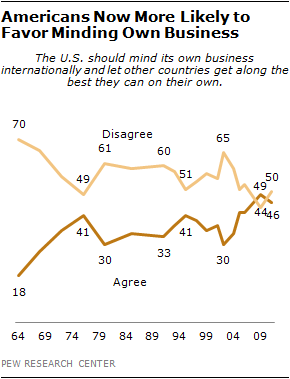 In the wake of widespread disillusionment over the protracted conflicts in Afghanistan and Iraq, nearly half of Americans say the country should mind its own business internationally and leave other countries to get along as best they can on their own — one of the highest readings of isolationist sentiment in decades.
In the wake of widespread disillusionment over the protracted conflicts in Afghanistan and Iraq, nearly half of Americans say the country should mind its own business internationally and leave other countries to get along as best they can on their own — one of the highest readings of isolationist sentiment in decades.
The Pew Research Center, and before it the Gallup Organization and Princeton University social psychologist Hadley Cantril, have for decades been asking Americans a series of questions on internationalist and isolationist sentiment; the data series goes back to the early 1960s. For most of the past 50-plus years, Pew Research Center Founding Director Andrew Kohut noted in a recent commentary, there’s been broad public support for international engagement.
Isolationist sentiments spiked briefly following the end of the Vietnam War and again after the collapse of the Soviet Union, but in recent years the percentages of Americans wanting the U.S. to mind its own business internationally has ranged from 42% to 49% (most recently 46%, in 2011), compared to an average of 36% over the 50-year study period. That, Kohut said, represents one of the highest measures of isolationist sentiment since the question started to be asked.
Several other recent surveys, on matters ranging from presidential priorities to the Syrian conflict, reveal other aspects of American disengagement — both in general and in response to specific foreign policy problems. In all, Kohut concluded, “the public feels little responsibility and inclination to deal with international problems that are not seen as direct threats to the national interest.”



